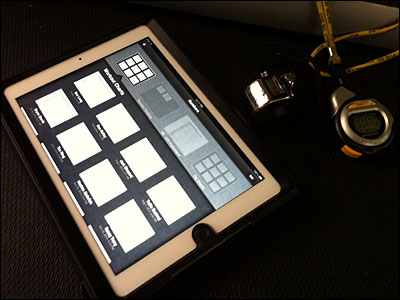“What gets measured, gets managed.” – Peter Drucker
Keeping accurate records of your workouts, food intake, and goal-specific measurements provides several benefits. It allows you to determine whether the things you want to improve are really improving, and if so how much. It also helps you to improve the effectiveness of your workouts and diet by indicating whether changes need to be made, and when changes are made what effect they have on your results.
Keeping records of these things also keeps you mindful of them and encourages you to make better decisions about them. Even if you’re not accurately weighing or measuring all of your food, just recording what you eat causes you to think more carefully about it and make better choices. When you keep records of your workouts you’re more likely to consistently put forth your best effort because you want to see those numbers improve. Records of goal specific measurements posted in a conspicuous place can help remind you of your goals and keep you focused on achieving them.
Goal-Specific Measurements
If your goal is to produce some change in your body composition or size you need to measure the thing you want changed and compare over time. If your goal is to improve some aspect of athletic performance or your ability to perform a specific sport or vocational task you need to measure and track it. If these measurements show steady improvement you’re doing things right, if not you know you need to re-evaluate your program, diet, practice, etc. and make changes. When you do, further measurements will allow you to determine whether the changes were beneficial, harmful, or made no difference.
Workout Charts
Workout charts allow you to evaluate progress over time and to compare the effects of changes in your program on goal-specific measurements. Minimally, you should record the date of each workout, the amount of weight used and the number of repetitions completed in good form (poorly performed reps should not be counted) on each exercise, and the order the exercises were performed in if it varies from the written order. I also recommend keeping track of the workout start and end time and notes on overall performance, such as exercise form and how you felt over the course of the workout. Recording the start time can help you determine whether you do better training during some times of the day than others, and recording the end time allows you to track overall workout duration and evaluate improvements conditioning and your ability to minimize rest between exercises.
When charting workouts it is important to keep in mind the records are for comparison and evaluation over time for the sake of adjusting your program to your body’s response to exercise, and not an end in themselves. Your goal is not to make numbers go up on paper, but to effectively stimulate improvements in functional ability, health, and appearance. If you focus on doing that, the numbers will show you how well you are doing. If you focus on the numbers you will tend to perform your exercises in a way that makes it easier to complete more repetitions rather than harder, which is the opposite of what you want.
Keep in mind the better you are at an exercise the harder it is, and if two people of equal strength perform an exercise with the same amount of weight the one who is better at the exercise will achieve momentary muscular failure more quickly and complete fewer repetitions because they are performing the repetitions in a way that is more challenging. When you increase the resistance used for an exercise it should be because you were capable of performing some number of repetitions despite attempting to make the exercise as hard as possible. Because of this, and because many other factors affect workout performance, it is important to evaluate your workout records over periods of many weeks rather than on a workout to workout basis. This is also why you should only count properly performed repetitions, and why you should make additional notes on performance.
Diet Journal
Depending on your goals a diet journal may simply be a list of what you eat over the course of a day, or a detailed record of the weight or volume of everything you consume along with breakdowns of calorie, macronutrient, and micronutrient content, meal times, blood glucose and urine tests, etc., or something in between.
This is helpful whether you are trying to lose fat, build muscle, or improve athletic performance or overall health, not only because it allows you to compare changes in these with your diet but also because when you are recording it you will tend to be more conscious about your eating and make better choices.
Accountability
Being accountable to someone else for this can help you be more disciplined about keeping track. More importantly, other people will usually be more objective in evaluating your records and can help give you needed reality checks when something isn’t working, or when it is working well and you’re being too hard on yourself or have unrealistic expectations.
It helps to partner with someone with similar goals and be accountable to each other, and agree to perform measurements and to regularly review and evaluate workout and diet records and give objective feedback and advice when required. As long as it is not your wife or girlfriend. Don’t even try to give your wife or girlfriend objective feedback on her eating, weight, or body fat. It’s just not worth the trouble. Have her partner with a friend instead, or get her a personal trainer.
If you are a trainer, make your clients do this. I’ve done it on and off with different clients over the years, and the ones who are measured or tested on a regular basis and who keep track of their eating consistently get better results than those who don’t.


Comments on this entry are closed.
“Don’t even try to give your wife or girlfriend objective feedback on her eating, weight, or body fat. It’s just not worth the trouble.”
Truer words were never spoken!
I was hoping to get my wife interested in HIT. I have certainly learned about not telling her to lose weight or criticize her eating habits, which I still put my food in my mouth occasionally. Has anyone had a positive experience working out with your wife/girlfriend?
Ian, my wife sort of listens to me. But realize that our wives and/or girlfriends are individuals who are perversely familiar with our shortcomings and personality flaws. (i.e. we are not perfect and therefore automatically suspect.)
Actually, I’ve had great results with my wife. I have to remind her that the bigger number on the scale is a GOOD thing due to her increased muscle mass, and to stay away from that stupid scale! (She looks better now at 35 than she did at 19 when we met!)
Of course, I HAVE had to be very careful… not only with how I phrase my complements, but also how I phrase my coaching when she wants to quit before failure. She, of course, is great at coaching me when I reach that same point in the workout.
The last paragraph is outstanding. We need to be reminded of what we are trying to achieve every single time we exercise. There’s a natural competitive psychology that produces the wrong goal, poor performance and bad results. I find it intrusive and unwelcome, but it’s there nevertheless.
What’s the point of recording the time under load?
ShoTo,
Years ago while working at Doug McGuff’s Ultimate Exercise training studio Terry Carter started timing clients’ sets instead of counting reps as this took away the incentive to loosen form for the sake of completing repetitions as they approached momentary muscular failure. He wrote about it online and it caught on and spread quickly through the SuperSlow community. The downside is when people are being timed some tend to slow down or “sandbag” in easier portions of the range of motion and during the negative for the sake of TUL. In either case it is important to focus on efficient muscular loading and intense contraction and achieving momentary muscular failure rather than the number of reps or seconds. Ideally, a person shouldn’t even think about it, they should focus solely on the exercise and someone else should be counting or timing and keeping track. This isn’t practical for everybody, though, and people who have a hard time focusing on the exercise while keeping count would benefit from timing their sets instead of counting reps.